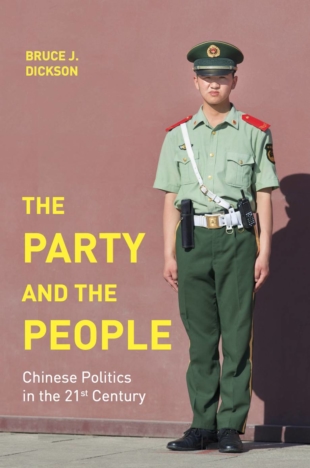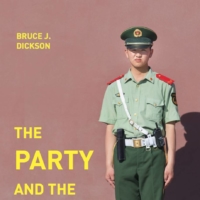One of a nation’s most salient features is the relationship between the leaders and the led, the expectations and the uncrossable lines that are drawn for the country’s best interests. In the case of China, it can be difficult for outside observers to understand its unique social contract, given the murky leadership of the Chinese Communist Party (CCP) and the reforms instituted under President Xi Jinping, arguably the most powerful Chinese leader since Chairman Mao Zedong.
The Party and the People: Chinese Politics in the 21st Century, by Bruce J. Dickson
328 pages
PRINCETON UNIVERSITY PRESS
Peeling back the communist onion is Bruce J. Dickson’s new book “The Party and the People: Chinese Politics in the 21st Century.” A professor of political science and international affairs at George Washington University, Dickson offers a comprehensive primer on how the CCP chooses leaders and makes policy, how it responds to political protests with repression both hard and soft, and how it may either use or constrain the forces of nationalism based on what helps its political survival.
Dickson refers to contemporary Chinese politics as a study in nuanced contrasts: authoritarian yet cooperative; repressive yet responsive to public opinion on certain issues.
“There are several elements of Chinese politics that may surprise outside observers,” Dickson says in an interview with The Japan Times. “The CCP responds to public opinion in different ways, including cleaning up air pollution, paying cash settlements to some protestors in order to end protests, or canceling projects to build dams or chemical plants when they encounter popular resistance. In fact, the party encourages public comments on draft laws and regulations.
“Another surprise may be that the CCP has a good deal of popular support and that support for democracy and democracy activists is low. People tend to want change to occur within the existing political system, not to replace it with something new.”
In calm, lucid prose, Dickson traces the evolution of the CCP since 1949, focusing on the recent divergence between local and higher-level leaders.
“The imperative from the CCP to create economic growth — for instance, by converting farmland for industrial purposes — creates tension between state and society, as local leaders take action that align with the party but infuriate local citizens,” writes Dickson. “With stability as another imperative, higher officials are often allies of local citizens, willing to remove local leaders to defuse conflict. In these instances, the CCP is responsive to public opinion — but will not tolerate demands that would challenge its monopoly on power.”
Of course, a lack of response on political issues can cause resentment, especially in a system — and a moment in time — where almost anything can become political: from academic freedom and internet access to ethnic minorities and a global pandemic.
As in many countries, the outbreak of the coronavirus in China, as well as the ensuing lockdowns and restrictions, put a strain on national stability and the trust between the government and the people. But while in the Western hemisphere some people pushed back against what they saw as repressive mandates, most Chinese embraced their leaders’ response once they compared it to other countries.
“When COVID-19 first broke out in China, many thought it would be a serious threat to the CCP’s legitimacy,” says Dickson, whose book covers the virus only in passing. “There was widespread anger at the initial missteps, such as not alerting the public, silencing doctors who tried to share information with other doctors, and the draconian measures to shut down much of the country for many weeks.
“But once the epidemic in China became a global pandemic, many people saw how other countries — in particular, the United States and Western Europe — handled it even worse. Instead of posing a threat to the CCP, its COVID-19 response seems to have increased its popular support. Not because it handled it so well, but because other governments handled it even worse.”
Such comparisons, however, are also a reminder of how much the CCP’s response may have followed its own maxim of “responsiveness without accountability.” From the onset of the pandemic, the CCP absolved itself of responsibility for any damage and suffering caused globally by COVID-19, which is widely believed to have stemmed from a wet market that neglected sanitary conditions. With calls now growing among the world’s scientific community to investigate the Wuhan lab leak theory, any ensuing lack of prestige for the CCP may affect its relationship with the people.
One of the most interesting parts of “The Party and the People” is Dickson’s exploration of whether China will become democratic. Dickson stresses that outside observers shouldn’t expect democracy to be the natural result of the country’s economic surge. He notes that, although the government hasn’t actually delivered on many economic reform proposals, most Chinese aren’t asking for more political freedoms, as long as their lifestyles can improve without them.
Still, the CCP may face headwinds from an unexpected direction. Increasingly, reports from China have been talking about ennui and burnout as a byproduct of the capitalist rat race. For some, the economic success has started to feel hollow, the purpose of the struggle unclear. As overworked workers are driven to suicide, most notably in the hyper-competitive tech industry, are the crazy rich Asians beginning to crash from their recent capitalist high?
“The pace of change in recent decades has been daunting, and many in China find it disorienting,” Dickson says. “The willingness to work hard in order to create a better life for yourself or the next generation is not unique to the Chinese people. It is an almost universal sentiment. But is it necessary for people to work 12-hour days, six days a week, in order to get ahead?
“For the CCP, the key question is whether people blame the party for their burnout and loneliness, or if those sentiments have more amorphous causes. As long as people remain optimistic about the future, this is not likely to be a problem for the party. But if more and more of the people abandon hope, that will be a problem not only for the party but the country as a whole.”
In a time of both misinformation and too much information, quality journalism is more crucial than ever.
By subscribing, you can help us get the story right.
SUBSCRIBE NOW





